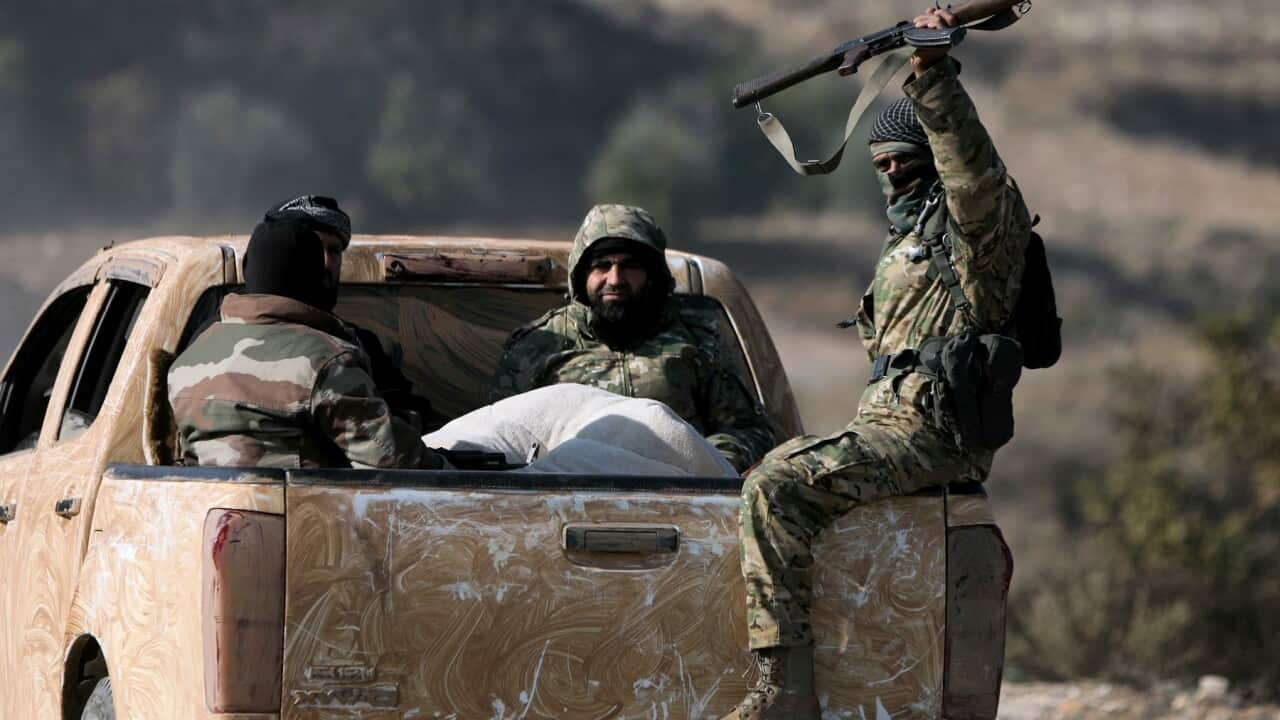TRANSCRIPT
The Syrian army has withdrawn from the central city of Hama after insurgents broke through its defences.
It's another setback for President Bashar al-Assad, after much of Aleppo fell to the rebels earlier in the week.
Rebel leader Abu Mohammed al-Golani says they are sanitising Syria's wounds:
"In the name of God, the most gracious, the most merciful. I give you good news, my brothers, that your brothers, the revolutionaries began entering the city of Hama to to sanitize up the wound that has been left in Syria for 40 years. I ask God Almighty that it be a conquest in which there is no revolt. The conquest is all mercy and love. Praise be to God."
The Syrian army says it redeployed from Hama and took positions outside the city to protect the lives of civilians.
Meanwhile Volunteers with the Syrian Civil Defence, a group also known as the 'White Helmets' that operate in rebel-held areas, are cleaning up the debris and damage on the streets of Aleppo after the rebels captured the city over the weekend.
Farouq Habib, external affairs spokesman for the White Helmets, says Aleppo's infrastructure has been heavily damaged and the city is facing multiple problems.
"People are in need everywhere in all areas, and the infrastructure is so weak. It was damaged by the earthquake last year and by more than a decade of bombardment and shelling. And there are, as I said, already big funding cuts on all humanitarian organizations in Syria. So that affects the health system itself to respond and meet the surge in these needs. There is a shortage and fuel, shortage in staffing, shortage in medical consumables. And the security threats themselves are the biggest barrier."
Tens of thousands of members of the Alawite minority community have been reported to be leaving Syria's third city, Homs.
Syria's President Bashar al-Assad comes from that community.
They're understood to be fearful that the insurgents will continue their advance from Hama, which is a mere 40 kilometres away.
The United States says it is closely monitoring the unrest in Syria and has seen reports of human rights abuses.
US Deputy Ambassador Robert Wood told the UN Security Council that the Assad regime had previously unleashed chemical weapons on its own people when the government was threatened.
"It is in situations like the one we face today when the Assad regime feels most at risk, and this is important, that the regime previously unleashed chemical weapons on its own people. Over the years, the Assad regime and its backers have attempted to distort the truth through lies and elaborate campaigns of misinformation about these chemical weapons attacks and those who have documented them. The facts are obvious, and no one should be fooled by these cheap tricks."
Syria's representative, Koussay Aldahhak, denied the allegations.
Meanwhile the leader of Hezbollah in Lebanon, Naim Kassim, says the United States and Israel are behind the fighting in Syria:
"After their deficit in Gaza and the blockage of the horizon, after the agreement to end the aggression against Lebanon, and after the failure of attempts to neutralize Syria, they are trying to make gains by sabotaging Syria again through these terrorist groups that want to overthrow the regime in Syria and want to cause chaos in Syria; and move Syria from the resistance position to another hostile position that serves the Israeli enemy."
United Nations Director General Antonio Guterres describes events in Syria as 'grave and dramatic', and adds there is an urgent need for humanitarian access to civilians in need and a return to the U-N sponsored political process to end the violence.
"All parties are obligated under international law to protect civilians. Now, this latest offensive was launched into Government-controlled areas by Hayat Tahrir al-Sham – a group sanctioned by the Security Council, along with a broad range of other armed opposition groups. It has led to significant shifts in the frontlines and tens of thousands of civilians are at risk in a region already on fire. We are seeing the bitter fruits of a chronic collective failure of previous de-escalation arrangements to produce a genuine nationwide ceasefire or a serious political process to implement Security Council resolutions. ThIis must change.."
Human Rights Watch is warning that the continued unrest raises concerns that civilians face a real risk of serious abuses at the hands of both sides of the conflict.













